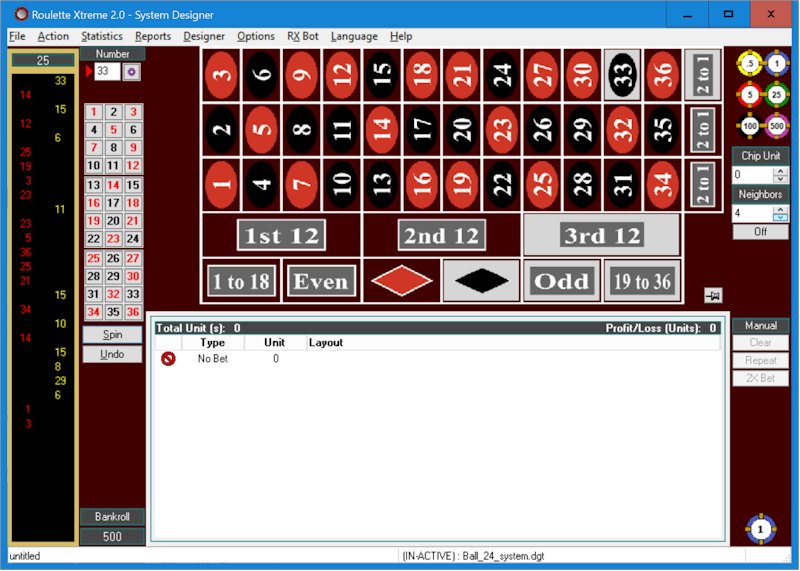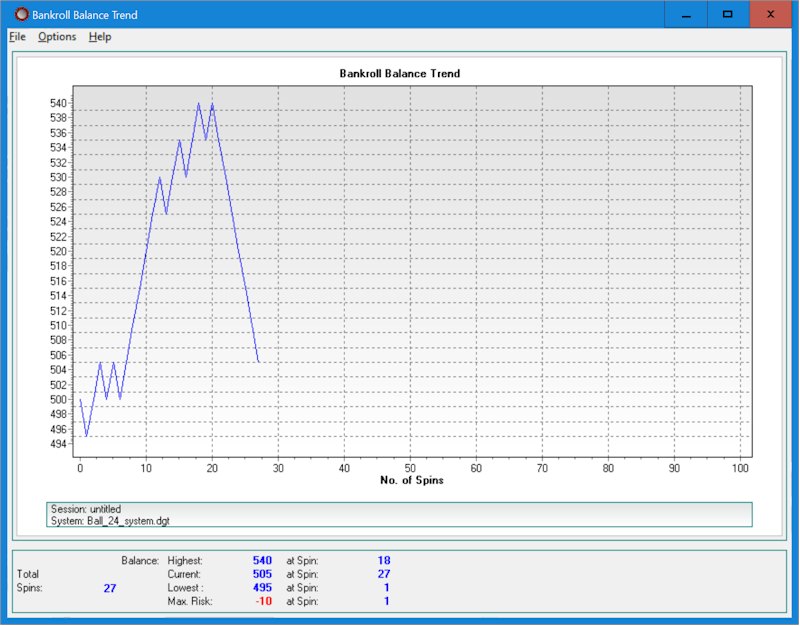Variance is basically the difference between results you expect, and results you get. Can you avoid or limit it?
In probability theory and statistics, variance is the expectation of the squared deviation of a random variable from its mean. Informally, it measures how far a set of (random) numbers are spread out from their average value. (source: Wikipedia)
Simple Explanation of Variance
Variance might sound like statistical mumbo-jumbo but the concept is quite simple. You don’t need to be bored with mathematical equations to understand how it affects your game. So here’s a practical example:
For this example, say there’s no green zero on the wheel. Imagine we have only red and black pockets. So there are 18 red pockets, and 18 black pockets.
If we were betting on red, we can expect to win approximately 50% of the time. But you’ll find almost always, you end up with slightly more of one color than the other.
In the case below, there are 10 blacks, and 15 reds which occurred in 25 spins:

You don’t necessarily need software specifically for testing roulette systems. You can use some of the online roulette (dutch) sites, but be wary that some of them use unrealistic spins that increase your chances of winning. This is to encourage you to start betting for real. If you stick only with the reputable online roulette websites, you shouldn’t have a problem.
Variance for Expected Profit/Loss
Most roulette system players consider variance more the ups and downs in their bankroll trend. For example, say we bet just red on a “no-zero” roulette wheel. Our odds of winning are 50%, so we can expect to break even.
Here’s a bankroll trend in such a situation (starting with 500 units bankroll):

We can see initially our bankroll sharply increases. This means there is variance towards red, and we are winning. But then our luck turns the other way, back towards more an even spread of red and black numbers.
The Mistakes Players Make
Keep in mind the data and examples above. Below are the common mistakes and misunderstandings of players:
Thinking if they can just avoid “negative variance”, then will profit.
The negative variance in this case is the part where the bankroll trend sharply declines. Yes if they could avoid the negative variance, they’ll be left only with the positive variance, which is where they profited.
But the problem is if the spin outcomes are completely random and unpredictable, how can you know when variance will shift for or against you? You can’t. It is important to understand random means random. It means there’s no way to know which number will spin next.
Thinking Variance Is a Trend
In the context of our example, positive variance is a series of wins, and negative variance is a series of losses. First you must understand a trend is a pattern that is likely to continue in the future. A trend is not a series of spins that happened in the past, without any correlation to future spins. If you consider the above bankroll balance, the series of wins appears like a trend. But in fact it’s just a series of random consecutive wins – nothing more. It is followed by a series of consecutive losses.
Is Variance Luck?
Variance is not specifically “luck”, but it’s not far from it. One of my forum members often explains to members if they replace the word “variance” with “luck”, they can better understand they’re wasting their time trying to control variance.
It doesn’t matter how your system works, and how you select where to bet. There will always be some deviation from what you expect.
Can You Count On Variance For a Balance or Rare Events?
Most players already at least have a vague understanding of variance. So they know after perhaps 100 spins, there will usually be slightly of one color than another. Another common mistake by players is to bet on the “rare event” that after 100 spins, there will NOT be a 50/50 spread between the two colors. Again for now we’re assuming our wheel has no green zero.
Here’s how such an approach would work:
- The player defines the amount of spins they’ll monitor. In this case, let’s assume we’re monitoring 100 spins.
- Towards the end of the 100 spins, the player counts the amount of red and black numbers. For example, say there were 45 black, and 50 red numbers.
- For the remaining 5 spins, the player bets red.
Why would the player bet red? It varies between the gambler, but typical reasons are they believe:
- Red will continue to be dominant
- The chances are we wont end up with 50 reds and 50 blacks, so that red is more likely to spin in the last 5 spins.
Of course the reasoning is nonsense, as any good roulette tips (dutch) site can explain. In either case, the variance is perfectly normal. The probability that red or black will spin next is exactly the same on each of the remaining 5 spins.
Conclusion
Gamblers are often a superstitious bunch. And they have some very warped ideas about what is more likely to happen in the game of roulette. Often roulette system players lack even a basic understanding of probability.
You might join a discussion board for casino gamblers expecting to find sound and helpful advice. But unfortunately you’ll rarely get accurate advice from such forums. If you are looking for accurate advice, you can try a reputable site such as ours, or a mathematics forum. Most gambling system forums are full of inexperienced players looking to share and discuss systems or ideas. but the vast majority of players actually making consistent profits from roulette have little time for forums. So you’ll rarely find players with experience on forums.
When it comes to variance, understand it is normal statistical behavior. You cannot predict it. You cannot predict when a winning or losing streak hits. It’s completely random. More specifically, it may not be random in the sense of it happening without any reason. But it is random in the context of winning and losing streaks being completely unpredictable. So there is no controlling variance.
However, if you aim only to reduce the volatility of your bankroll balance, then try betting on more numbers. Basically the more numbers you bet, the less you win, but the more frequently you win. This makes your results more predictable, and less volatile. But it comes at a cost, which is when the ball avoids your numbers, you lose a large amount in a single spin.
Is there a solution? The only solution is increasing the accuracy of predictions by understanding why the ball lands where it does. Then you can formulate a strategy that takes advantage of physical variables that determine the winning number.
To get the best free roulette systems that really work, see the top 5 proven roulette systems and the video series below. It's the best 100% free information for winning roulette you'll find. It's written by professionals who are really earning a living from roulette. |

